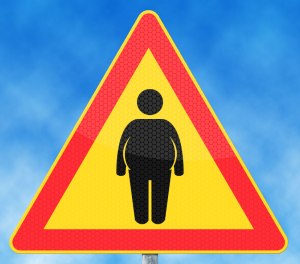Fat and fit?
I watched a Swedish television commercial the other day. It consisted of depicting a slightly portly middle-aged woman winning a range of different Olympic sports. The point of it – I think – was to show that middle-aged women are better than you think at things you didn’t think they could do; an idea that the company behind the commercial – an internet service provider focusing on online gaming – was eager to enforce.
But regardless of the message or the motive behind the commercial, it got me thinking: does being overweight stop you from being a healthy human being? Is what we’ve been told actually true – that being overweight is a sure ticket to heart conditions, diabetes, circulatory problems and all the rest? Or is there something else hidden here? Could we have oversimplified the issue?
Conventional wisdom
There is such a mountain of statistical data showing links between numerous diseases and being overweight that it has become the conventional wisdom of the medical profession. And not just the medical profession either; the same links are used in the insurance business and the fitness industry as well as generic healthcare services. There is a lot of money to be made on this, and to reinforce the idea that being overweight is the same as being unhealthy. No one wants to be unhealthy after all, and being told that you are will most like trigger a behavioural change, in order to fight this evil overweight and become healthy again. It’s then a piece of cake (mmm, cake…) to sell in services that cater to that need to lose weight.
Case in point: when I had my yearly medical a while back, it was pointed out that I could do with losing some excess weight and that additional exercise would be a good idea. My first reaction was to immediately start planning how to lose this overweight to assure my good health. But then I had second thoughts. Ok, so I don’t participate in any team sports or spend my free time at the gym, but I eat (more or less) healthily and I walk 6-7 km at a brisk pace daily. That should at least make sure I’m not exceptionally unfit, shouldn’t it? I mean, one doesn’t want to be manic about fitness, does one?
But, on the other hand, those statistics are a frightening read…
Lies, damned lies and statistics
It turns out that the truth is a little more complex than what the statistics are indicating. What we think we see in the statistics could just be common symptoms rather than cause and effect. Even though it is indeed true that people who are overweight are more likely to also suffer from diabetes, heart conditions and circulatory problems, it doesn’t automatically follow that the former is the cause of the latter. Rather, an equally valid answer would be that an unhealthy lifestyle is the cause of both. This would mean that you could get all the health problems listed above without being overweight and that you could be overweight without developing a single one of them.
Now, obviously I can’t deny that certain conditions are linked directly to being overweight. If you happen to be very overweight, you might start suffering from pains in your joints, and your heart would have to work harder to power a bigger and heavier body. But that’s not my point. My point is that in the current culture of manic weight loss, even healthy young people who are just above the ‘normal’ weight (or indeed at or under it) are desperately trying to lose weight by dieting and excessive training and exercise. That is not healthy behaviour, and is just a few tiny steps away from turning into full-blown eating disorders like anorexia or bulimia.
The tide is turning
Lately, reports have started to challenge the old wisdom. Studies have been carried out to more closely investigate the link between obesity and the lack of fitness. They all show that keeping fit is much more important than losing weight. Obese people who exercise regularly and lead a healthy life have a much lower risk of morbidity than people who are of ideal weight but unfit.
But don’t take my word for it. Here are a few quotes, starting with the Harvard Health Policy Review:
“A fit man carrying 50 pounds of body fat had a death rate less than one-half that of an unfit man with only 25 pounds of body fat.”
And the Annals of Epidemiology:
“Consistently, physical inactivity was a better predictor of all-cause mortality than being overweight or obese.”
And from The President’s Council on Physical Fitness and Sports:
“Active obese individuals actually have lower morbidity and mortality than normal weight individuals who are sedentary … the health risks of obesity are largely controlled if a person is physically active and physically fit.”
And finally the International Journal of Obesity Related Metabolic Disorders:
“An interesting finding of this study is that overweight, but fit men were at low risk of all-cause mortality.”
To summarise: being unhealthy is much more dangerous than being overweight. And being overweight is not the same as being unhealthy. Although they can sometimes correlate, they are independent, and should be viewed as such.
So, if you’re feeling guilty lusting after that cheeseburger or pizza – don’t worry. As long as you have a reasonably healthy lifestyle, and it’s not in direct conflict with any pre-existing medical conditions, go ahead. Enjoy. Life is short enough; live it a little.
P.S. Just after finishing this post I read on New Scientist that not only does being overweight have no negative effects our health and longevity but it could actually be beneficial. Indeed, carrying a few extra pounds seems to make you live longer than if you’re at your ‘ideal’ weight. There you go: yet another reason not to forgo that dessert.
P.P.S. I’ve added a motivational “Fat and fit” pullover inspired by this post to my Zazzle store:


















I love the meticulous nature of your writing style. You don’t wantonly ignore counterpoints, and it makes for a reasonable discussion.
LikeLike
Why thank you!
In all honesty it’s a way of pre-empting any attacks on my core thesis. By voicing concerns or counterpoints, I essentially disarm any opponents ahead-of-time. (It’s a good trick, but it’s not mine, it’s Socrates’.)
LikeLike
I covet the hoodie.
LikeLike
Heh, really? I put it there mostly on a whim.
LikeLike
I love this. I’m going to just point people here when they start randomly fat-shaming for no reason, and backing it up with “facts” about how really, fat people are all going to DIE TERRIBLE FAT-RELATED DEATHS.
(PS, someone writing this comment has insanely-low blood pressure, which makes the doctors go, “HUH? THIS SHOULD NOT BE HAPPENING BECAUSE YOU ARE NOT THIN!” and then they re-check it and they’re like “THIS MACHINE, MAYBE IT IS BROKEN” and I’m all “Nope, I just win at life and/or genetics.”)
LikeLike
Thank you!
Yes, exactly. Even though there are illnesses and conditions directly related to being overweight, they don’t actually affect the overall health and longevity of the person if they’re keeping fit.
The reason for the misunderstanding that overweight people are unhealthy most likely comes from the fact that unhealthy people tend to put on weight. What we are starting to understand now is that that weight isn’t really the problem, it’s just a symptom.
LikeLike
Yup, being fit is the most important. I don’t know if you guys use the BMI scale over there, but I pretty much want to throw it out the window. At my lowest weight/highest level of fitness in the past couple years, I was just BARELY under the threshold between overweight and obese. I knew there was no way I was ever going to see a “normal” weight without taking some drastic (and unhealthy) measures. Which I’m fine with. Except for when it affects what I have to pay for health insurance and other such nonsense.
LikeLike
(To clarify… I’m fine with not getting to a “normal” weight; I’m not fine with taking unhealthy measures to get there.)
LikeLike
The sooner we scrap the concept of ‘normal’ weight, the better. Or ‘normal’ anything. Nothing good ever comes from comparing people to what we call ‘normal’.
LikeLike
Quite so. It’s all about fitness.
I’m upset that there are penalties to be paid for being overweight. It seems very unfair. But that most likely relates to the problem of estimating good (or bad) health. It’s much easier to just take someone’s weight and judge them on that. Wrong, but easy. Prejudice wins again.
LikeLike
Reblogged this on Repeat Prescription and commented:
Interesting post. In the context of vitamin D, if you’re skinny but deficient, you won’t be healthy. If you’re obese, you’re also likely to be vitamin D deficient due to a) less probable outdoor [and indoor] activity, and b) D trapped in fat reserves.
LikeLike
Thanks for reblogging my post!
I don’t know if I agree with that vitamin D would be trapped in fat reserves. Any vitamin D produced by the skin would be readily excreted into the blood stream in the many blood vessels branching through the lower epidermal layers and then picked up by the liver and finally converted to the active form of vitamin D in the kidneys. Any excess that is not needed by the body will at a later stage be stored in the fat reserves, but it will never affect what’s available to the body.
As to obese people being sedentary: yes, that’s quite common which explains the correlation between being overweight and being unhealthy, but the point of my post was to show that there’s no direct link. You can be overweight or obese and still highly mobile and in good health. And if you’re out and about, you will produce plenty of vitamin D in your skin from the UV radiation in the sunshine – regardless of your body weight. Unless you’re using sunscreen, that is…
LikeLike
Thanks for the comment back, Andreas.
There is some debate about whether D before hydroxylation gets trapped in fat but it hasn’t reached a conclusion.
In my reblog I just wanted to share that as vitamin D is appearing critical to health, that being slim and vitamin D deficient may not be better than being overweight and replete.
LikeLike
That is indeed a good point. Even though vitamin D isn’t strictly speaking a vitamin, as we can synthesize it ourselves, it is absolutely essential for good health.
And I have no doubt that vitamin D is stored in fat but I believe it’s happening after any vitamin D that is required by the body has been extracted by the liver from the blood stream. It wouldn’t make evolutionary sense for it to work the other way.
LikeLike
Definitely, it’s better to class D as hormone-like.
This is one study about rising vitamin D levels after weight loss; correlation though: http://www.ncbi.nlm.nih.gov/pubmed/20534751
LikeLike
Interesting, although we should be careful reading too much in to that correlation. Also, it doesn’t say if the subjects were in good health or not, only that they were obese.
LikeLike